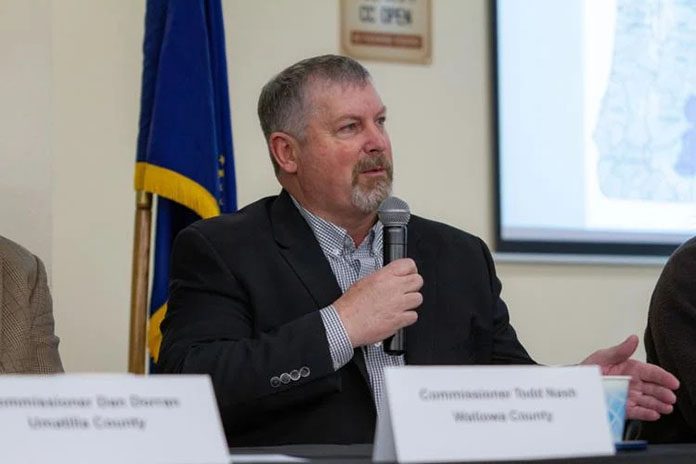
Todd Nash is eager to take his seat in the 83rd Oregon Legislature in January and anticipates being able to cover some familiar ground.
“I’m happy to get appointed as the vice chair of the Senate Natural Resources Committee,” Nash said in an email. “This committee was my top priority and I’m very grateful to be placed there. Wildlife, water, weeds and land management will all be within our purview.”
Although he’ll be a state senator, Nash said he anticipates having an effect on the federal level as well.
“Though federal lands will be outside our scope of authority, we as a state can’t ignore the poor performance of Forest Service and (Bureau of Land Management) timber management,” the Republican said.
Voters on Senate District 29 elected Nash on Nov. 5 to take the seat of retiring Sen. Bill Hansell of Athena. Since then, he and Hansell have been working closely for a seamless transition. Senate District 29 comprises all of Gilliam, Morrow, Sherman, Umatilla, Union, Wallowa and Wheeler counties, as well as parts of Clackamas, Jefferson, Marion and Wasco counties.
Nash, who won a four-way primary race in May to earn the GOP nomination, also is a cattle rancher and a former president of the Oregon Cattlemen’s Association.
As a Wallowa County commissioner for the past eight years, he has focused largely on natural resources issues in the county. He expects to be sworn into the Senate on Monday, Jan. 13.
During Nash’s two years as president of the OCA, he was a strong advocate for changing how wolves are managed. He hopes to see the gray wolf delisted under the federal Endangered Species Act statewide. At present, the predators are given federal protection west of Highways 395, 78 and 95, and managed by the Oregon Department of Fish and Wildlife east of those highways.
Ranchers east of those highways are allowed to shoot wolvres to protect their livestock. But some ranches straddle Highway 395 — a boundary wolves are ignorant of. Much of the support for wolf protection comes from urban Western Oregon.
Nash said he hopes to both learn and educate during his time in the Senate.
“I would not pretend to be able to be an expert on issues that aren’t rural community-related,” he said. “I will certainly learn what I can from urban and metro legislators, but at the same time I wouldn’t expect them to be experts on any rural issues.”
Nash has said he hopes the incoming Trump administration will be friendlier to rural Oregon on federal issues. At the Dec. 18 Wallowa County Board of Commissioners meeting, he said he hopes to see some flexibility out of the federal government on the 21-inch rule in Oregon, which was created to protect wildlife habitat and water quality. It prohibited the cutting of most live trees thicker than 21 inches at breast height (4.5 feet above the ground) in national forests east of the Cascades. The rule has limited the harvest of merchantable timber in areas such as Wallowa County, which once had mills that relied on such timber.
“But now they’re no longer able to adapt to it,” Nash said, adding that he believed it would be “unfortunate” to be locked into a plan that would allow little, if any, adaptation.
He also is unsure what, if anything, he’ll be able to do as a senator in the face of the Democrat-dominated state government’s attempts to “Trump-proof” Oregon’s sanctuary state status, which protects people who are in the country illegally from being deported. Oregon became the first such sanctuary state in 1987.
“I don’t necessarily agree with the Democratic majority in the Legislature or with the Democratic governor on some issues, but that’s the way it is,” Nash said. “Such things are entirely out of my purview as a senator.”










